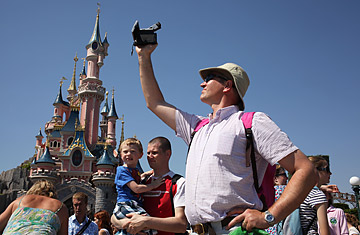
Castle in the sky Disney overestimated visitors and their spending
When the Walt Disney Co. opened Disneyland Paris 20 years ago, many French people wouldn't have bet 10 centimes that the theme-park resort, 32 km east of the French capital, would be a success. Critics lambasted the government for striking a deal with Disney that seemed to benefit the U.S. company far more than the French state. They mocked Disney's manic attention to detail, its ban on alcohol and its choice of rainy Paris over sunny Barcelona. And they wondered how such quintessentially American entertainment could thrive in the land of Molière, Cocteau and Sartre. Disney's implantation in France, Ariane Mnouchkine, a theater director, famously declared, was "a cultural Chernobyl."
How wrong they were. This year, to mark the 20th anniversary, the French state issued a report card that is an eloquent response to the critics. Disneyland Paris, which now attracts as many visitors as the Louvre and the Eiffel Tower combined, has created 55,000 jobs in France, and the return on the French state's investment has been stellar: $8.5 billion in taxpayers' money has turned into $61 billion in added value for the French economy through additional tourism revenue and taxation. "I can say without ambiguity that it has been a big success," enthuses Vincent Pourquery de Boisserin, director of the government agency that works with Disney and is charged with development of the region surrounding it.
If only the Walt Disney Co. could say the same. Disneyland Paris may have been a boon to France, but as an investment and shareholding for Disney, based in Burbank, Calif., the venture has been a dog — and not of the fluffy, lovable variety usually associated with the company.
Despite being one of the top tourist destinations in Europe, attracting 15.6 million visitors last year, Disneyland Paris continues to struggle financially. It's run by Euro Disney SCA, a French company that is 40% owned by the Walt Disney Co. and that has had to negotiate a restructuring of its finances with bank creditors not once but twice. Disney was supposed to receive a steady annual revenue stream from royalty payments and management fees from the park. But for more than half of the 20 years of the resort's existence, it has had to waive, reduce or defer those fees because of the troubled financial situation. Even so, Euro Disney has reported a loss for 12 of those years, including every year since 2009.
The reason? After the wild success of the Disney theme park in Japan, Euro Disney got over-ambitious, taking on more debt than the French resort could handle and over-estimating the size and spending habits of its new audience. Those miscalculations explain why Disney, unlike France, hasn't capitalized on the sea of visitors the park brings in.
Although things are starting to look up — its cash flow is growing, and it's finally turning an operating profit, thanks to tight cost control, better marketing and extra financing from a French state-owned bank — the net losses look set to continue for a few more years until the company can finally bring its $2.2 billion in debt down to a more manageable level. And that's if all goes well. With Europe battling a sharp economic slowdown and a simultaneous banking and currency crisis, the risks are huge. Disney, whose global parks and resorts make up more than a quarter of the company's revenue, has been relying on expansion abroad to boost growth. U.S. parks and resorts still make up a bigger chunk of the business, but much of Disney's 21% profit jump last quarter was thanks to growth at Disneyland Tokyo.
The capital-intensive theme-park industry by its nature is a long-term business, but there are signs that after two decades, investor patience is wearing thin. Sources close to the company tell TIME that Disney is considering a buyout of Disneyland Paris in order to shore up its longer-term prospects. The move wouldn't lessen the boon for the French state, but it would enable Disney to turn around the park's finances. And it would end a long slow bleed for Euro Disney's stockholders; the stock, which started trading in November 1989 at $13.50 and hit a peak of $30 when the park opened, is now worth just over $6. Disney didn't comment on the possible buyout but says it remains committed to the "invaluable asset."
